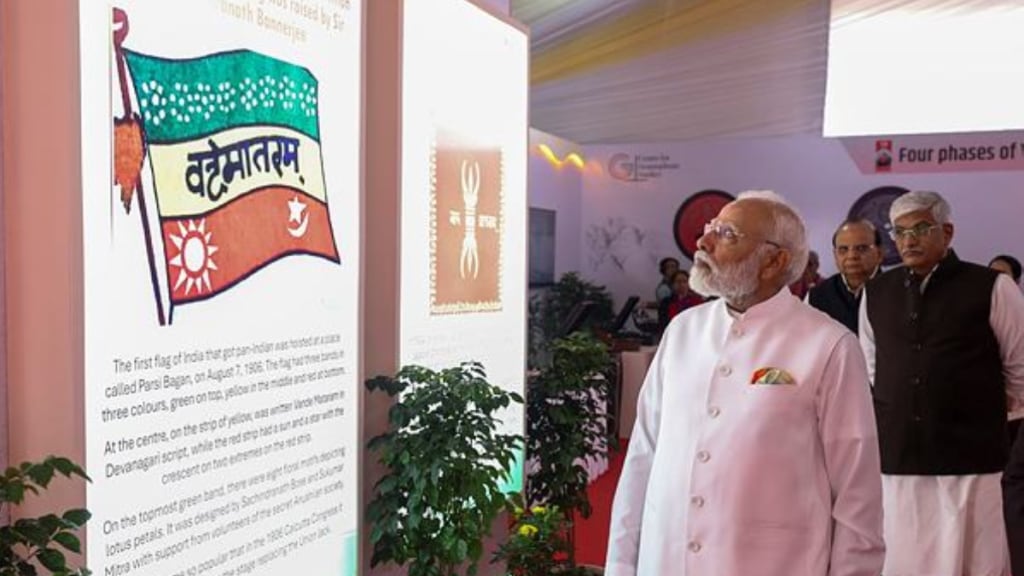150 years of Vande Mataram: As the National Song, Vande Mataram, marks its 150th anniversary today, November 7, Prime Minister Narendra Modi released a commemorative stamp and a coin, followed by leading a nationwide recitation of the National Song at Delhi’s Indira Gandhi Indoor Stadium.
‘Vande Mataram is a prayer to Maa Bharati’: PM
The occasion also marks the launch of a year-long celebration from November 7 to November 7, honouring 150 years of Bankimchandra Chatterjee’s “timeless composition that inspired India’s freedom struggle,” the PMO said in a statement, before adding that it continues to embody national pride and unity.
PM, while addressing the event, said that Vande Mataram is a “mantra, energy, dream and resolve,” before calling it a “prayer to Maa Bharati”.
“Vande Mataram, these words are a mantra, an energy, a dream, a resolve. Vande Mataram, these words are devotion and worship to Maa Bharti. Vande Mataram, these words take us into history, they fill our present with new confidence, and they give our future this new courage that there is no resolve that cannot be achieved, no goal that we, the people of India, cannot attain,” the PM said.
We mark 150 years of Vande Mataram, a song that has inspired generations to rise for the nation. Addressing a programme in Delhi. https://t.co/qQqjgmSXy5
— Narendra Modi (@narendramodi) November 7, 2025
PM calls November 7 a ‘historic day’
This comes after PM Modi on November 6 posted about the “historic day”.
“Tomorrow, November 7, will be a historic day for the countrymen. We are going to celebrate the glorious 150 years of the Vande Mataram song. This is that inspiring call which has imbued many generations of the country with the spirit of patriotism,” PM Modi wrote on X (formerly Twitter), when translated from Hindi to English.
He added, “On this special occasion, we will have the privilege of participating in a ceremony in Delhi around 9:30 in the morning. Here, a commemorative postage stamp and coin will also be released. The collective singing of Vande Mataram will be the main attraction of this event!”
कल 7 नवंबर का दिन देशवासियों के लिए ऐतिहासिक होने जा रहा है। हम वंदेमातरम् गान के गौरवशाली 150 वर्षों का उत्सव मनाने जा रहे हैं। यह वो प्रेरक आह्वान है, जिसने देश की कई पीढ़ियों को राष्ट्रभक्ति की भावना से ओतप्रोत किया है। इस विशेष अवसर पर सुबह करीब 9:30 बजे दिल्ली में एक समारोह…
— Narendra Modi (@narendramodi) November 6, 2025
The national song was written by Bankimchandra Chatterji during the “auspicious occasion of Akshaya Navami” today in 1875.
“Vande Mataram first appeared in the literary journal Bangadarshan as part of his novel Anandamath. The song, invoking the Motherland as the embodiment of strength, prosperity and divinity, gave poetic expression to India’s awakening spirit of unity and self-respect. It soon became an enduring symbol of devotion to the nation,” it stated.
Vande Mataram: All about the song that became India’s eternal cry for freedom
1- Vande Mataram, which translates to “Mother, I Bow to Thee”, was adopted as the national song of India in 1950. According to Know India, the national song enjoys an “equal status” with Jana-gana-mana.
In 1950, Dr Rajendra Prasad said, “The composition consisting of the words and music known as Jana Gana Mana is the National Anthem of India, subject to such alterations in the words as the Government may authorise as occasion arises; and the song Vande Mataram, which has played a historic part in the struggle for Indian freedom, shall be honoured equally with Jana Gana Mana and shall have equal status with it.”
3- Rabindranath Tagore first sang the national song at the 1896 Congress Session in Calcutta, and it was used as a political slogan a few years later.
“Vande Mataram as a political slogan was first used on 7 August 1905 when thousands of students, representing all communities, rent the sky with cries of Vande Mataram and other slogans as they went in procession towards the town hall in Calcutta (Kolkata) where, at a largely attended historic meeting, the famous resolution on boycott of foreign goods and vow of swadeshi was adopted, signalling the anti-partition of Bengal movement,” read a part of the release by PIB.
4- The same year, 1905, the Bande Mataram Sampradaya was founded in North Calcutta to turn love for the motherland into a mission and religious passion. The members of this society held Prabhat Pheris on Sunday, during which they used to sing “Vande Mataram” and collect voluntary donations. Rabindranath Tagore would sometimes join them.
The British administration, in order to curb the rising influence of “Vande Mataram”, prohibited the chanting of the song in schools and colleges. When around 200 students defied this, they were fined Rs 5 each.
In 1906-1907, even as the song was banned, delegates, youth, and protestors continued to chant “Vande Mataram” and faced police action.
5- In August 1906, Bipin Chandra Pal launched the English daily “Bande Mataram”, and Sri Aurobindo later joined as joint editor.
6- Two years later, Madam Bhikaji Cama raised the tricolour flag for the first time outside India in Stuttgart, Berlin, with the words “Vande Mataram” written on it.
7- In 1909, before being hanged in England, freedom fighter Madan Lal Dhingra’s final words were “Vande Mataram”.
8- Gopal Krishna Gokhale was greeted in Cape Town, South Africa, with a grand procession echoing the chants of “Vande Mataram” in October 1912.
(With inputs from PIB)

